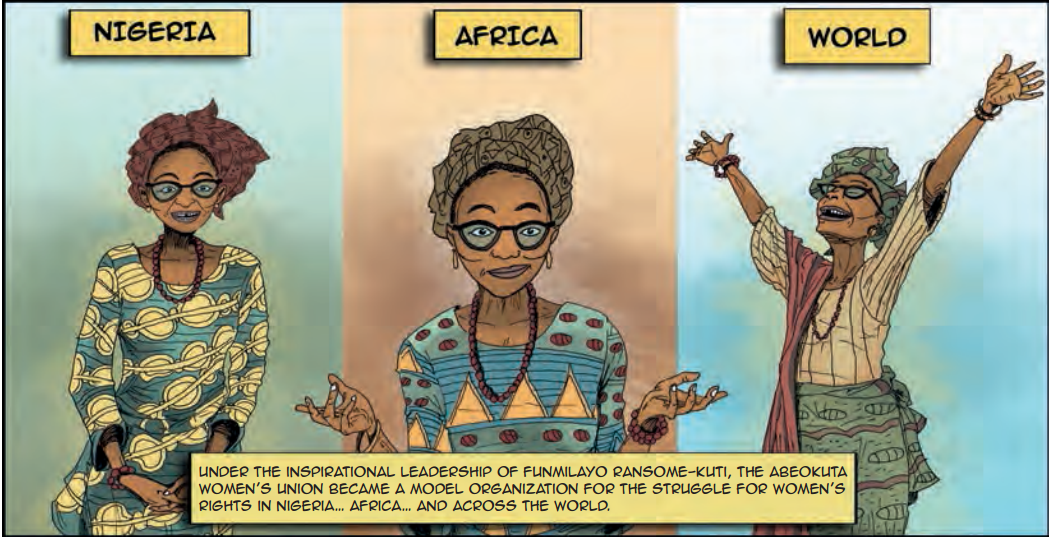summary
Funmilayo Ransome-Kuti, born Frances Abigail Olufunmilayo Thomas, was a strong Nigerian female educator, women’s rights activist, and political campaigner. She was the first female student to attend Abeokuta Grammar School, located in Ogun State, Nigeria. In her young-adult years, she taught preschool students as well as arranged literacy classes for lower income women. In her 40s, she established the Abeokuta Women’s Union. This organization demanded better representation of women in their local governments and an end to unfair taxes on marketing women.
The Abeokuta Women’s Club was established in 1932 by Funmilayo Ransome-Kuti. In the club’s earlier years, the members were predominantly Christian, Western-educated white women. The club mostly focused on charity work, sewing, catering, and adult education classes. In the 1940s, the club shifted to a more political organization. Kuti began to organize literacy clubs for market women who were members of the Abeokuta Women’s Club. She started this portion of the organization because of a friend of hers who was an illiterate member. This opened Kuti’s eyes up to the social and political inequalities Nigerian women face every single day. She wanted to break the stereotype of Nigerian women only being useful for cooking and cleaning around the house.
In 1946, the club was renamed from the Abeokuta Ladies Club to the Abeokuta Women’s Club (AWU). It was now open to all women in Abeokuta. During this time, a local Abeokuta ruler, Alake Ademola II, was imposing additional taxes on the market women. In response, Kuti and her women at the AWU refused to pay these absurd taxes that were simply based on their social status and gender. Furthermore, the members of the AWU also conducted long vigils outside the Alake palace, and arranged an audit of the Sole Native Authority System (SNA) finance records. In addition to terminating the over taxation of Nigerian women, the AWU also demanded representation in the SNA.
Kuti lead marches and protests with over ten-thousand attendees. Once she started to gain traction in the media, she was invited to attend overseas conferences, where they would discuss national constitutions. She also aided in the founding of other organizations such as the Federation of Nigerian Women’s societies. Through her actions and organizations, she became known as a member of international peace and the women’s rights movement.
From her many successes, she was awarded the Lenin Peace Prize, which was given to those who had “strengthened peace among comrades”. In addition, she was also awarded membership in the Order of the Niger for her work.
photo #1

photo #2

photo #3

CITATIONS
photo #1:
"File:Funmilayo Ransome-Kuti graduate.png." Wikimedia Commons, the free media repository. 13 Oct 2020, 22:52 UTC. 1 Mar 2021, 02:24 <https://commons.wikimedia.org/w/index.php?title=File:Funmilayo_Ransome-Kuti_graduate.png&oldid=489034718>.
photo #2:
"File:Funmilayo Ransome-Kuti and megaphone.png." Wikimedia Commons, the free media repository. 13 Oct 2020, 22:52 UTC. 1 Mar 2021, 02:32 <https://commons.wikimedia.org/w/index.php?title=File:Funmilayo_Ransome-Kuti_and_megaphone.png&oldid=489034799>.
photo #3:
"File:Funmilayo Ransome-Kuti and world.png." Wikimedia Commons, the free media repository. 13 Oct 2020, 22:52 UTC. 1 Mar 2021, 03:02 <https://commons.wikimedia.org/w/index.php?title=File:Funmilayo_Ransome-Kuti_and_world.png&oldid=489034760>.
source #1:
“Funmilayo Ransome-Kuti.” Wikipedia, Wikimedia Foundation, 16 Jan. 2021, en.wikipedia.org/wiki/Funmilayo_Ransome-Kuti.
additional information:
https://en.wikipedia.org/wiki/Funmilayo_Ransome-Kuti
source #2:
“Funmilayo Ransome-Kuti.” Encyclopædia Britannica, Encyclopædia Britannica, Inc., www.britannica.com/biography/Funmilayo-Ransome-Kuti.
additional information:
https://www.britannica.com/biography/Funmilayo-Ransome-Kuti
source #3:
“Funmilayo Ransome-Kuti.” ZODML, 23 Sept. 2014, zodml.org/discover-nigeria/people/funmilayo-ransome-kuti.
additional information: https://zodml.org/discover-nigeria/people/funmilayo-ransome-kuti